- Published: Tuesday, June 25 2019 20:39
A Second Chance
What happened to all those donated solar glasses?
Zoe Chee
June 18, 2020
The upcoming annular solar eclipse will be passing over the skies of Africa, the Middle East and Asia on June 21, 2020. The ring of fire eclipse is different from a total eclipse in that viewers of this spectacular event need eye protection at all times or use projection methods to enjoy it. So solar glasses for this kind of eclipse are very important.
I'll be totally honest, I really didn't think that it would be possible for Astronomers Without Borders to be able to distribute any of our recycled glasses for this eclipse due to the lockdowns caused by the COVID crisis.
I thought that people would never be able to receive them in time because of shipping delays. Who would distribute them in these lockdown conditions?
Hope in the time of COVID-19
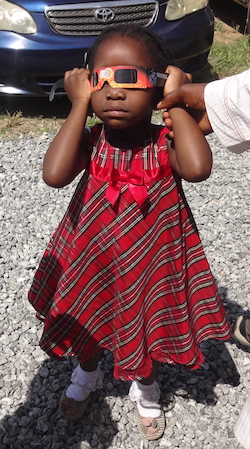 I was approached by the African Astronomical Society about six weeks ago and they showed me that hope and determination was going to make that a possibility.
I was approached by the African Astronomical Society about six weeks ago and they showed me that hope and determination was going to make that a possibility.
This dedicated group of astronomers who were certain that they would spread information and resources throughout their countries while physically distancing themselves. The importance in sharing their knowledge and wonder of this eclipse outweighed the struggle they encountered in these unpredictable circumstances.
I was immediately bought into zoom conversations with representatives from Tanzania, Ghana, South Africa, Kenya, Ethiopia, Nigeria and Rwanda, many of which are AWB National Coordinators. Niruj Ramanujam, Head of the Outreach Committee of the African Astronomical Society lead the team, organizing online resources that can be easily accessible and awareness campaigns that are being created so that locals would be able to watch this wonderful event safely and that they would not be afraid of the incoming darkness. All media are involved in all countries from television, radio, print to online social media..
All representatives requested glasses. The difficulties in shipping, timing and shutdowns made it impossible to send these materials to most countries. However, our Ethiopian National Coordinator and Director, East Africa Regional Office of Astronomy for Development, Alemiye Mamo Yacob found success through diplomatic channels.
International Diplomatic Cooperation
He contacted the Ethiopian embassy in the United States and the United States embassy in Ethiopia. Both agencies pitched in to bring 16,000 glasses into the country! I have learned that Personal Protection Equipment is being shipped with the glasses from the United States into Ethiopia!
We are tightly squeezed in our timeline and although they have yet to hit Ethiopian soil (scheduled delivery is Friday!), their destiny is to be distributed in Lalibela. A notably historic town of about 17,000 citizens will be handed out by volunteers. "There are volunteers who are already assigned for this purpose so they will move around the city and nearby villages by car with megaphones both to make public awareness about the eclipse i.e to provide basic information about eclipse and safety precautions, not to be afraid of the darkness, and other stuff. at the same time they will distribute the glass i.e in household bases or for individuals. (the city administration have already experienced in this area, cause they used to distribute sanitizer and other support for people due to COVID)." Aleymiye told me in an email.
Incredible to think that a system that helped protect people from disease is being used to help give hope and togetherness in the form of donated glasses.
Our National Coordinator from Kenya, Susan Murbana and her husband Chu will be broadcasting the eclipse for all to watch online. Stay tuned for links to their feed on our social channels.
A special thanks goes to Scott Roberts, Mike Hatch and the incredible staff at our long-time supporter Explore Scientific who have donated shipping staff time and warehouse space for this program and the North West Arkansas Space organization for making sure that the donated equipment is safe for reuse.
Connections
As the glasses are now finally on their last leg of their travels, I am allowed a few moments to reflect on their journey. It's amazing for me to think that these same glasses were once on the faces of families from all around the United States, sent and vetted in a warehouse in Arkansas, USA, waited for three years and are now on their way to help people view a very similar event across an ocean, country, town and onto another individuals eyes.
We are not alone, we have made a connection.
We are all one people, under one sky.
July 9, 2019
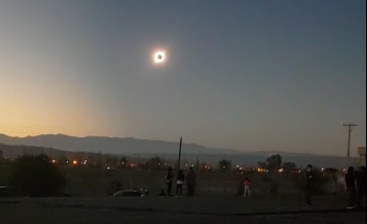 The eclipse was a beautiful sight on July 2, 2019. From the reports that we have been receiving, the weather where all the glasses were distributed, the skies stayed clear for all to enjoy the brilliant sun's rays extinguished by the moon's shadow.
The eclipse was a beautiful sight on July 2, 2019. From the reports that we have been receiving, the weather where all the glasses were distributed, the skies stayed clear for all to enjoy the brilliant sun's rays extinguished by the moon's shadow.
Last week was such a flurry of activity! We were so lucky to have attracted the eyes of major publications as CNN, National Geographic, NPR and Space.com and more (please see the list at our press page). The news was even noted in Peruvian papers.
We had local newspapers write about their contributions and with well wishes to those who saw the eclipse.
Similar feelings were shared on Facebook.
 |
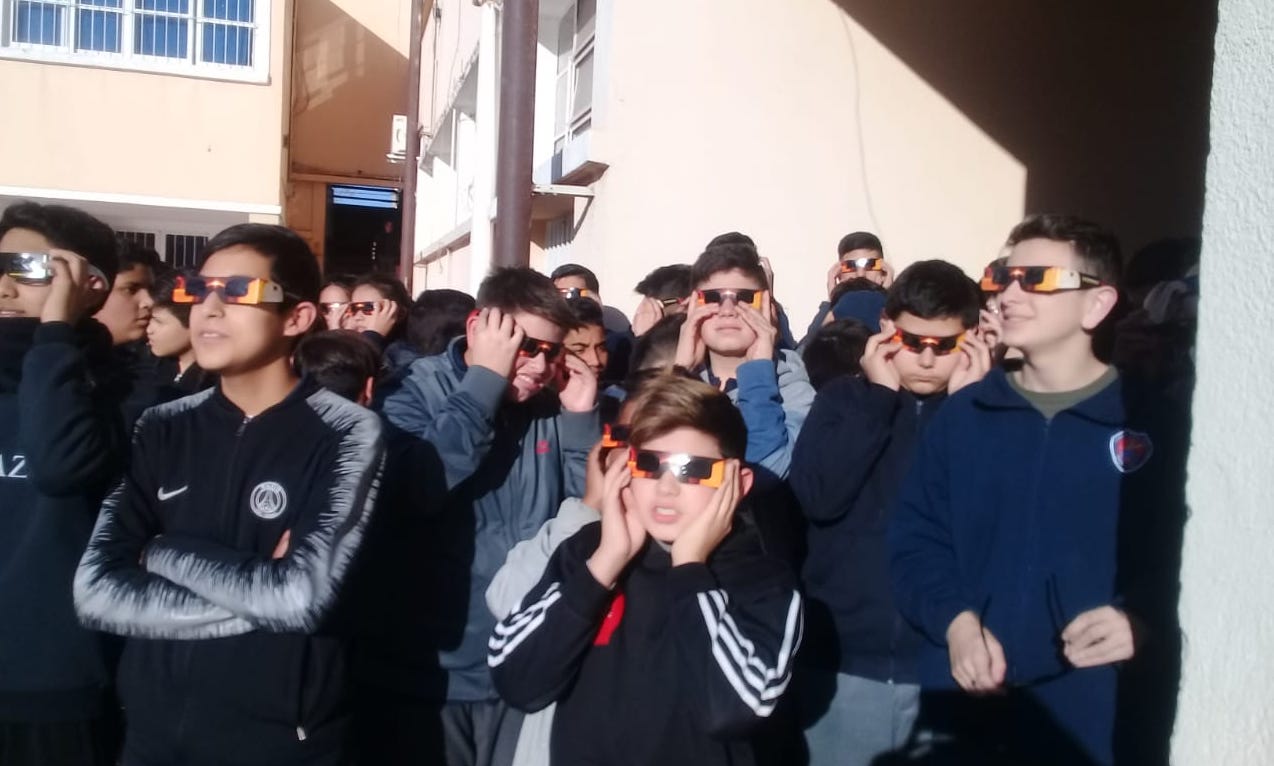 |
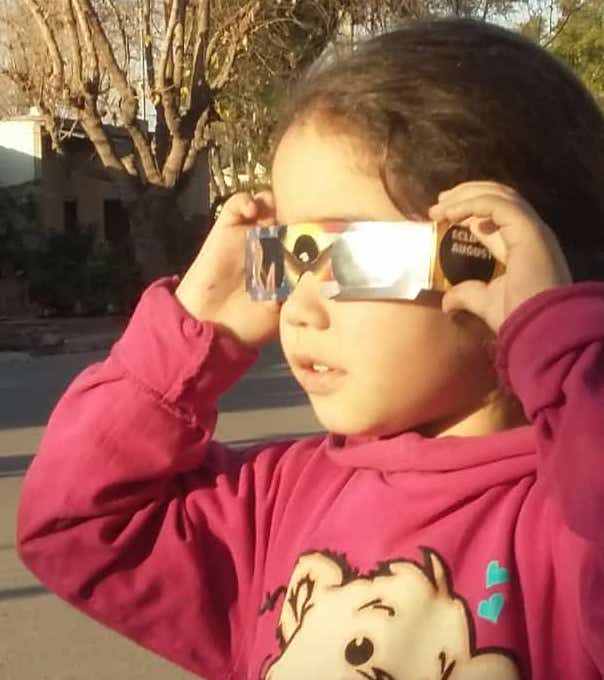 |
As soon as the eclipse was over, we were receiving photos from the event. Photos of children, families and schools under a shaded sun streamed in from Argentina wearing glasses that were recycled.
Please visit our Facebook gallery to see more photos from the eclipse.
Reading all the kind comments and well wishes made this unique project worth it!
June 25, 2019
Every eclipse is a fascinating natural occurrence. Witnessing the sun shining in the sky and then slowly disappear under the shadow of the moon strikes amazement in the minds of the young and old.
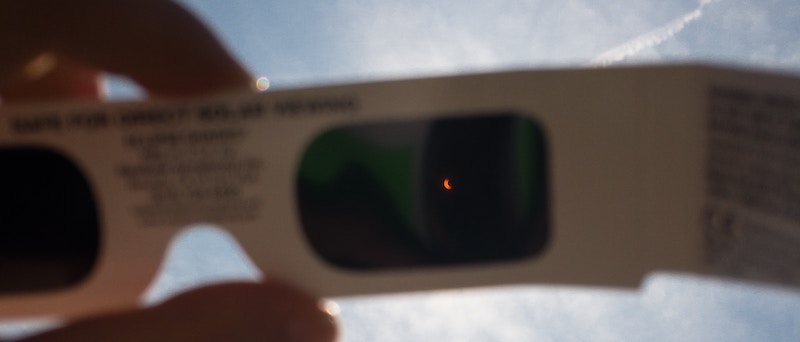
On July 2, 2019, this eclipse is extra special for Astronomers Without Borders, the American public and the people of South America. In an action of generosity, a conscientious effort to preserve the planet through recycling and the desire to share in a spectacular event, those who saw the Great American Eclipse in 2017 donated their glasses to many observers in South America.
Viral Collecting: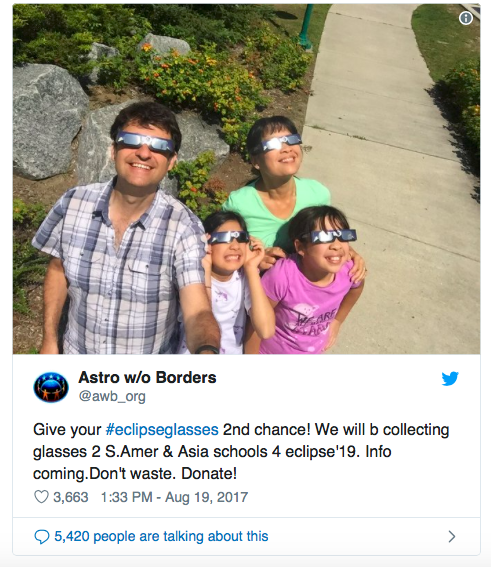 Right after the total solar eclipse that occurred on August 27, 2017, Astronomers Without Borders put out a social call for people to send their glasses to us so that we could recycle them for the next solar eclipse.
Right after the total solar eclipse that occurred on August 27, 2017, Astronomers Without Borders put out a social call for people to send their glasses to us so that we could recycle them for the next solar eclipse.
We got an outstanding result! Our social channels were ablaze with likes and shares. The media were calling us for days looking for more information about how people could participate to hand over their nearly new, lightly worn glasses to another who would have a chance to glance what they just did.
We were getting glasses from individuals, sending small in envelopes to classes, companies, organizations sharing entire boxes. all over the country. We set up a collection centre database so that people could drop their glasses off at an easily accessible location. About 1000 collecting centers registered on our website and an estimated 5 million glasses were sent!
Large, medium and small companies sent glasses. Organizations like National Parks, Highway Safety Officers, Libraries, Real Estate Agencies were creating boxes so that viewers could be deposited and sent. Explore Scientific partnered with us to house the incoming goods.
Vetting: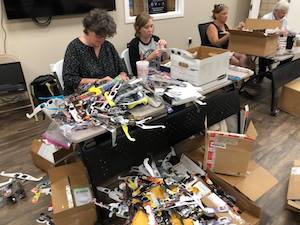 The glasses were tucked away in boxes and envelopes of all different sizes, stored in piles at the Explore Scientific warehouse in Arkansas. All the space was donated. The next time the glasses saw the light of the sun was when the NWA.space volunteered their time on weekends to look through every set of glasses to make sure they were safe for reuse. Glasses with scratches, lint, holes or frauds were eliminated from the pile and repacked for shipping. Thanks to hours of patience this precious optical apparatus were repacked and were ready for transport to their final destinations.
The glasses were tucked away in boxes and envelopes of all different sizes, stored in piles at the Explore Scientific warehouse in Arkansas. All the space was donated. The next time the glasses saw the light of the sun was when the NWA.space volunteered their time on weekends to look through every set of glasses to make sure they were safe for reuse. Glasses with scratches, lint, holes or frauds were eliminated from the pile and repacked for shipping. Thanks to hours of patience this precious optical apparatus were repacked and were ready for transport to their final destinations.
Getting them to where they’re needed: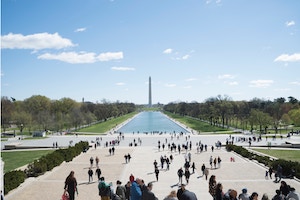 Astronomers Without Borders started reaching out to their network of amateur astronomers to find homes for the recycled glasses. Several groups stepped forward to receive them, however due to the fact that they were recycled goods and in some cases that they were coming from outside of their countries, customs would not allow their entry. In order for the glasses to get to people who needed them, we had to reach out to embassies. Astronomers Without Borders is so grateful for our partner, Associated University Inc. (AUI) and Tim Spuck who introduce us to the various South American Embassies who helped ship some of the glasses. Along the way, we made new friends and opened our circle of community.
Astronomers Without Borders started reaching out to their network of amateur astronomers to find homes for the recycled glasses. Several groups stepped forward to receive them, however due to the fact that they were recycled goods and in some cases that they were coming from outside of their countries, customs would not allow their entry. In order for the glasses to get to people who needed them, we had to reach out to embassies. Astronomers Without Borders is so grateful for our partner, Associated University Inc. (AUI) and Tim Spuck who introduce us to the various South American Embassies who helped ship some of the glasses. Along the way, we made new friends and opened our circle of community.
The Mad Dash:
One month before the eclipse our team at Explore Scientific were putting together boxes and boxes of glasses, preparing them for shipping to Peru, Chile and Argentina.
Astronomers Without Borders sent 30,000 glasses to the Instituto Geofisico del Peru for distribution in 14 universities and planetaria in 6 regions around the Lima area. 2500 glasses went to the Arequipa, Peru for the Colca Planetarium’s celebration of the eclipse that will be co-hosted by Gandhi Palomino of Fotografia Arentea and Dante Lucioni from Colca Planetarium. 8000 were sent to Argentina that were distributed along the path of the eclipse by partner and friend Beatriz Garcia from National Scientific and Technical Research Council, Mendosa, Argentina and about 2500 glasses to the US Embassy in Chile which will be distributed in two special workshop events.
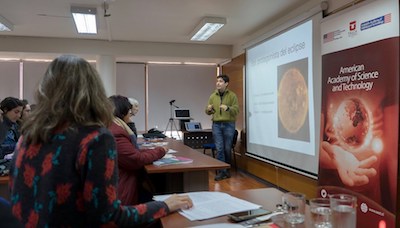 Astronomers Without Borders partnered with the US Embassy in Chile under their American Academy of Science and Technology to create two eclipse workshops. On June 25, a teacher-to-teach workshop was held in Santiago, Chile bringing together 30 Chilean teachers in the Santiago area to speak with Astronomers Without Borders member American teacher Eric Muhs to talk about how he brought the eclipse to his classroom for the 2017 Great American Eclipse. A separate student workshop was held on June 27 to connect US students who witnessed the 2017 eclipse and share their experience with 30 Chilean students who would soon view the same phenomenon.
Astronomers Without Borders partnered with the US Embassy in Chile under their American Academy of Science and Technology to create two eclipse workshops. On June 25, a teacher-to-teach workshop was held in Santiago, Chile bringing together 30 Chilean teachers in the Santiago area to speak with Astronomers Without Borders member American teacher Eric Muhs to talk about how he brought the eclipse to his classroom for the 2017 Great American Eclipse. A separate student workshop was held on June 27 to connect US students who witnessed the 2017 eclipse and share their experience with 30 Chilean students who would soon view the same phenomenon.
So Many Thanks:
There are so many people that made this whole program happen. Thanks to the American public for thinking of others and the environment.
Tim Spuck from Associated University Inc. (AUI) who partnered with us to make the necessary connections within South American Embassies in Washington D.C. and continues to link us up with Asian governments for the next eclipse in December 2019.
Dinah Arnett and Micaela Carrasco Fagnilli from the US Embassy and American Academy of Science and Technology, Chile who put together a two day workshop that connected US teachers and students who witnessed the 2017 total solar eclipse and shared their experience with teachers and students in Chile who will see a similar event demonstrating that astronomy can connect us regardless of time or location.
Scott Roberts at Explore Scientific who helped kindly leant the company’s warehouse space for vetting, sorting and housing the millions of glasses that were sent. To Mike Hatch and his shipping team who were always timely in getting the various of packages of glasses packed and ready for shipping.
Much appreciation is given to Peter Tamblyn of Planetary Science Directorate, Southwest Research Institute who helped connect us with the US Embassy in Argentina that funded the transport of the package that reached Beatriz Garcia of Instituto de Tecnologías en Detección y Astropartículas (ITeDA), Medoza, Argentina. The glasses are being distributed to many who live along the path of totality eclipse in Argentina.
Patricio Lindeman from the Peruvian Embassy who connected me with Danny Eddy Scipion Castillo from the Instituto Geofisico del Peru and funded their large shipment. Also in Peru, Gandhi Palomino of Fotografia Arentea and Dante Lucioni from Colca Planetarium for distributing glasses at their event.
I would especially like to thank Mike Simmons, president of Astronomers Without Borders who had the vision of connecting people through donation, environmental conscientiousness and the feeling of awe we feel when the Sun disappears under the shadow of the Moon. Kevin O'Neill who rounded up the glasses and helped push this enormous project through. Diana Robinson who picked up all the pieces and organized them. Frances Azaren, who was always there to get a shipping quote for ANY amount of glasses. Lindsay Bartolone whose professionalism and grace brings impactful educational resources that added a long term aspect to this program and everyone else at Astronomers Without Borders who supported this effort to this point.
Next Chapter:
All the glasses that have been shipped out for this eclipse and have now arrived at their final destination. Next stop - December 26, 2019. An annular solar eclipse will be passing over the skies of the middle east and Asia. We are excited to announce that we have already made contacts in the effected areas to send more recycled glasses.
Donate and come along for the next leg of our journey together!
One People, One Sky
Partners:
 Associated University Inc. |
 |
 US Embassy - Chile |
 |
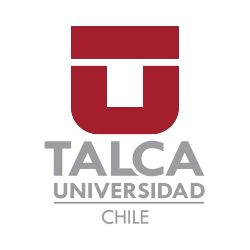 |
 |
 NWA.Space |
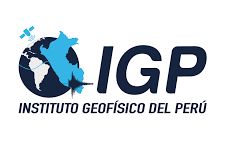 |
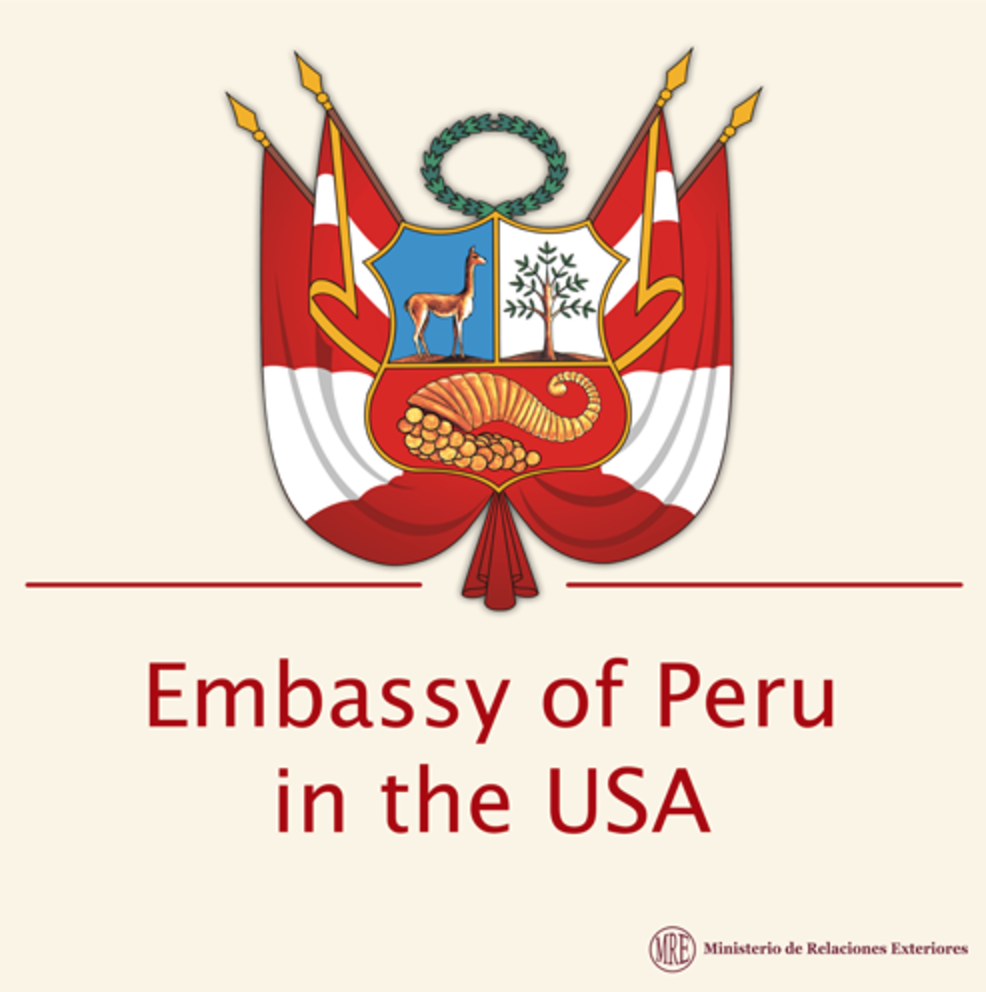 |
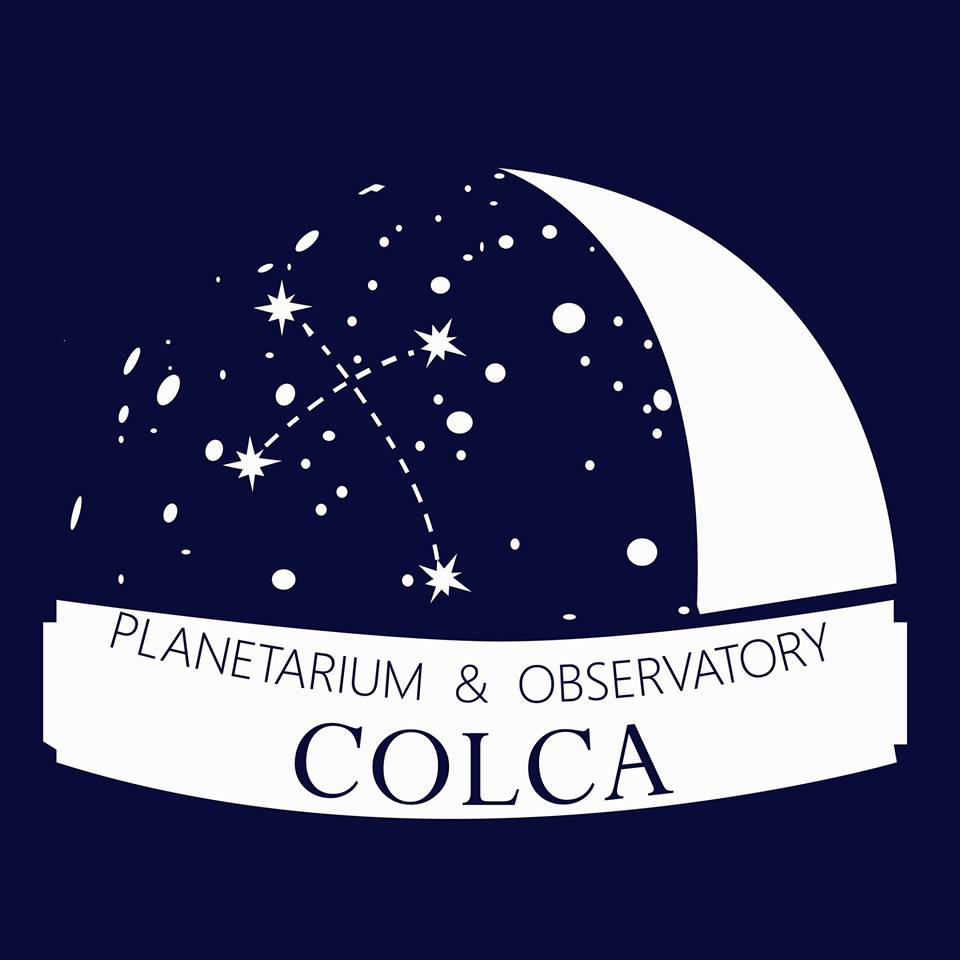 |
 |
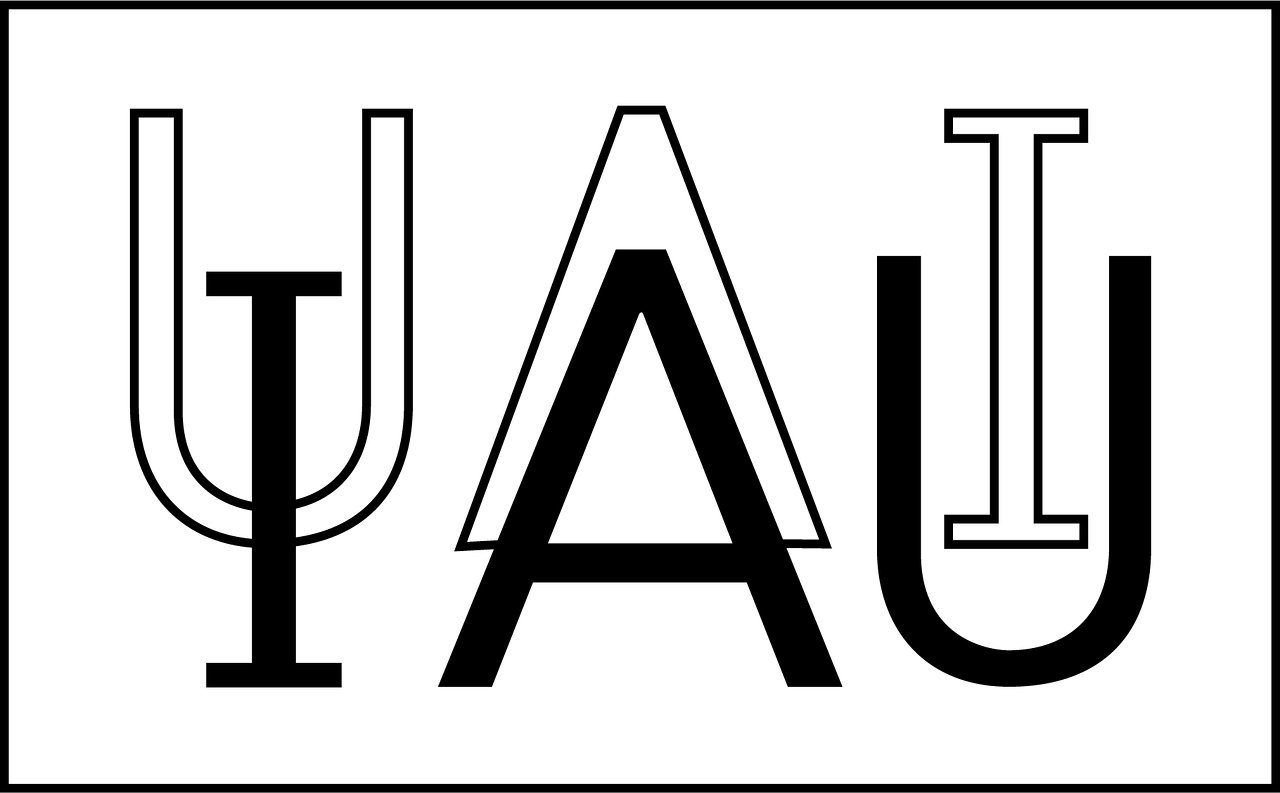 |
 US Embassy in Ethiopia US Embassy in Ethiopia |







